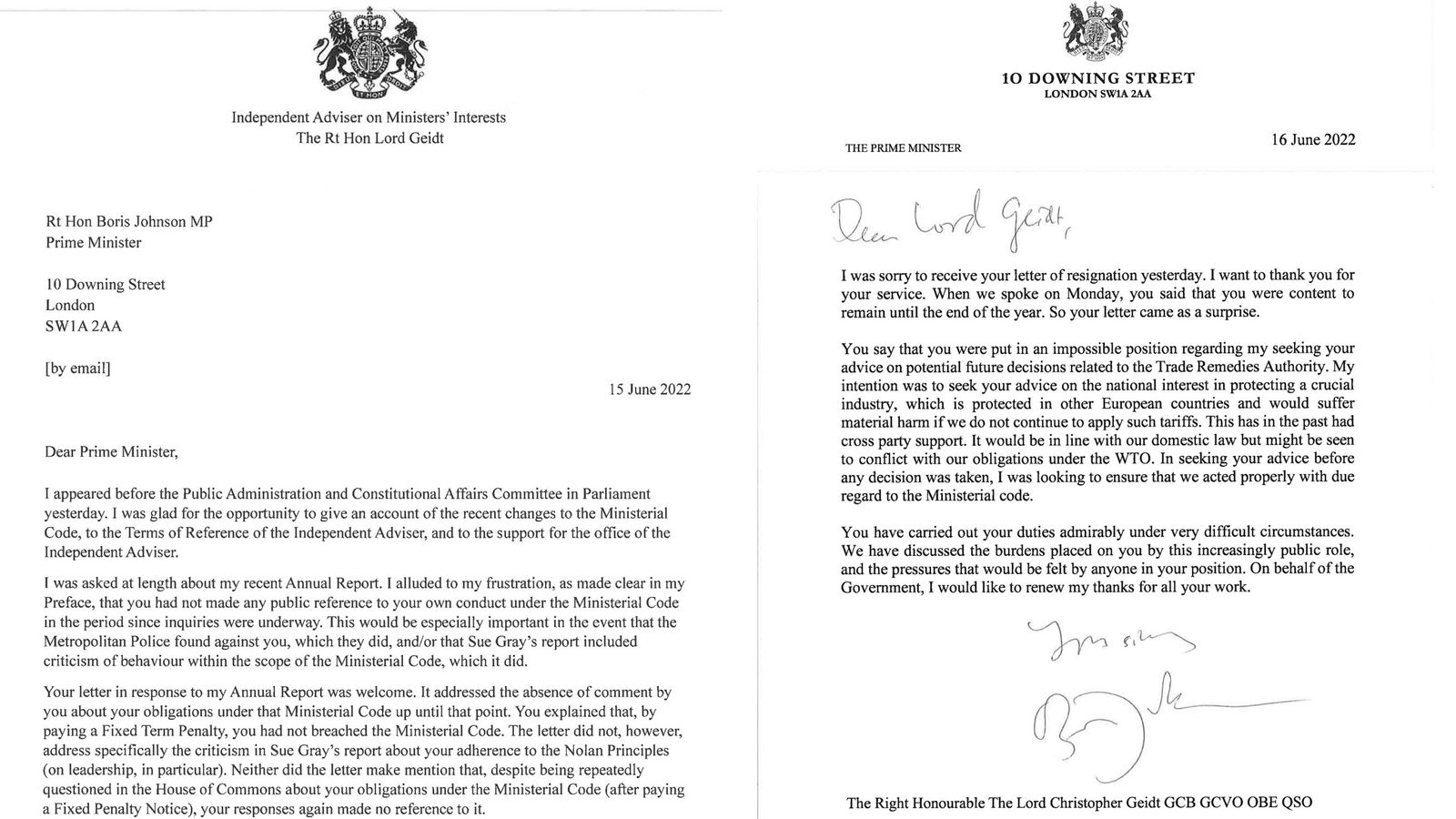Lord Geidt, who was Boris Johnson’s ethics adviser, resigned on Wednesday evening.
Downing Street has published his letter and the prime minister’s response.
Read the letters in full below.
Lord Geidt‘s letter to Prime Minister Boris Johnson
Dear Prime Minister,
I appeared before the public administration and constitutional affairs committee in parliament yesterday.
I was glad for the opportunity to give an account of the recent changes to the ministerial code, to the terms of reference of the independent adviser and to the support for the office of the independent adviser.
Downing Street publishes resignation letter from PM’s ethics adviser Lord Geidt
Lord Geidt: PM’s ethics adviser quits a day after admitting ‘frustration’ over partygate
David Buttress: New cost of living business tsar appointed by government
I was asked at length about my recent annual report, I alluded to my frustration, as made clear in my preface, that you had not made a public reference to your own conduct under the ministerial code in the period since inquiries were underway.
This would be especially important in the event that the Metropolitan Police found against you, which they did and/or that Sue Gray’s report included criticism of behaviour within the scope of the ministerial code, which it did.
Politics Hub: Lord Geidt ‘had a pretty rough grilling by MPs’, says Raab
Your letter in response to my annual report was welcome. It addressed the absence of comment by you about your obligations under the ministerial code up until that point.
You explained that, by paying a Fixed Term Penalty, you had not breached the Ministerial Code.
The letter did not, however, address specifically the criticism in Sue Gray’s reporter about your adherence to the Nolan Principles (on leadership, in particular).
Neither did the letter make mention that, despite being repeatedly questioned in the House of Commons about your obligation under the Ministerial Code (after paying a Fixed Penalty Notice), your responses again made no reference to it.
Please use Chrome browser for a more accessible video player
I reported to the Select committee yesterday that I was satisfied that you had responded to my Annual Report to explain your position.
I am disappointed, however, that the account you gave was fuller, as noted above.
Moreover, I regret the reference to the ‘miscommunication’ between our offices, with the implication that I was somehow responsible for you not being fully aware of my concerns.
These inconsistencies and deficiencies notwithstanding, I believe that it was possible to continue credibly an Independent Adviser, albeit by a very small margin.
This week, however, I was tasked to offer a view about the government’s intention to consider measures which risk a deliberate and purposeful breach of the Ministerial Code.
This request has placed me in an impossible and odious position.
My informal response on Monday was that you and any other minister should justify openly your position vis-a-vis the Code in such circumstances.
However, the idea that a prime minister might to any degree be in the business of deliberately breaching his own Code is an affront.
A deliberate breach, or even an intention to do so, would be to suspend the provisions of the code to suit a political end.
This would make a mockery not only of respect for the code by licence the suspension of its provisions in governing the conduct of Her Majesty’s ministers.
I can have no part in this.
Because of my obligation as a witness in Parliament, this is the first opportunity I have had to act on the government’s intentions.
I, therefore, resign from this appointment with immediate effect.
Yours sincerely,
The Rt Hon Lord Geidt
Boris Johnson’s response
Dear Lord Geidt,
I was sorry to receive your letter of resignation yesterday.
I want to thank you for your service.
When we spoke on Monday you said that you were content to remain until the end of the year.
So your letter came as a surprise.
You say that you were put in an impossible position regarding my seeking your advice on potential future decisions related to the Trade Remedies Authority.
My intention was to seek your advice on the national interest in protecting a crucial industry, which is protected in other European countries and would suffer material harm if we do not continue to apply such tariffs.
This has in the past had cross-party support.
It would be in line with our domestic law but might be seen to conflict with our obligations under the WTO.
In seeking your advice before any decision was taken, I was looking to ensure that we acted properly with due regard to the ministerial code.
You have carried out your duties admirably under very difficult circumstances.
We have discussed the burdens placed on you by this increasingly public role, and the pressures that would be felt by anyone in your position.
On behalf of the government, I would like to renew my thanks for all your work.







